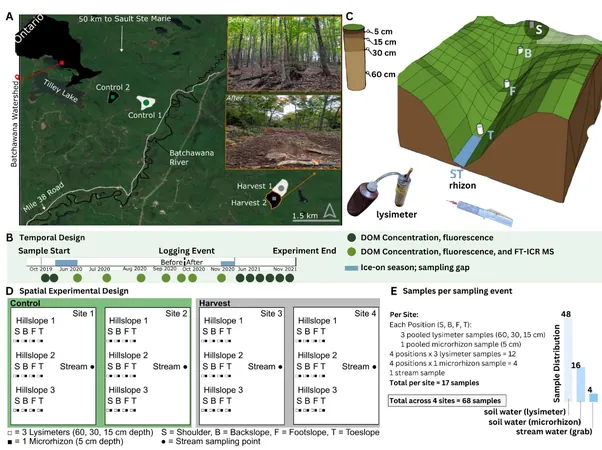
Logging May Wreck Our Carbon Storage Efforts: Shocking Study Reveals True Cost of Deforestation!
2025-09-09
Author: Arjun
The Hidden Costs of Logging in a Warming World
As global demand for wood-based products soars, the logging industry attempts to keep pace sustainably by replacing logged areas with tree farms. However, while this regrowth is thought to contribute to carbon storage, a groundbreaking new study reveals a critical oversight: significant carbon loss through soil runoff.
A Deep Dive into Canadian Logging Practices
Published in the Proceedings of the National Academy of Sciences, researchers undertook a comprehensive three-year study focused on dissolved organic materials (DOM) in runoff from logging areas in Ontario, Canada. By analyzing both logged and control sites, the team utilized advanced techniques to analyze the concentration and composition of DOM.
Dramatic Increases in Carbon Loss
The results were startling: after tree harvesting, DOM concentrations surged fourfold within the first two months due to soil disruption and the removal of tree cover. This shift is not just temporary—the molecular composition of DOM became significantly more reactive and diverse, remaining altered for at least two years post-harvest.
Why This Matters: The Carbon Cycle Crisis
The implications are serious. The researchers explain that the carbon released into nearby streams is more prone to returning to the atmosphere compared to carbon that stays locked within the soil as mineral-associated organic matter. While not every bit of DOM contributes to atmospheric carbon, more microbe-friendly compositions can expedite the process.
Logging: From Carbon Sink to Potential Source
Worryingly, the study estimates that 6.4% of the carbon removed during timber extraction is lost as DOM, potentially flipping the logging narrative from a beneficial carbon sink to neutral or even carbon-releasing activities. This revelation could significantly alter strategies in forest management and climate mitigation.
Rethinking Carbon Accounting for the Future
The findings underscore a crucial need: carbon loss through DOM runoff must be factored into any calculations regarding the carbon sequestration capabilities of logging activities. This recalibration of carbon accounting, especially in vulnerable northern regions, is vital for accurate environmental strategies.
As policymakers assess strategies for combatting climate change, understanding the dynamics of DOM runoff becomes essential. Without considering these aquatic carbon fluxes, we risk miscalculating the potential benefits of sustainable logging practices.



 Brasil (PT)
Brasil (PT)
 Canada (EN)
Canada (EN)
 Chile (ES)
Chile (ES)
 Česko (CS)
Česko (CS)
 대한민국 (KO)
대한민국 (KO)
 España (ES)
España (ES)
 France (FR)
France (FR)
 Hong Kong (EN)
Hong Kong (EN)
 Italia (IT)
Italia (IT)
 日本 (JA)
日本 (JA)
 Magyarország (HU)
Magyarország (HU)
 Norge (NO)
Norge (NO)
 Polska (PL)
Polska (PL)
 Schweiz (DE)
Schweiz (DE)
 Singapore (EN)
Singapore (EN)
 Sverige (SV)
Sverige (SV)
 Suomi (FI)
Suomi (FI)
 Türkiye (TR)
Türkiye (TR)
 الإمارات العربية المتحدة (AR)
الإمارات العربية المتحدة (AR)